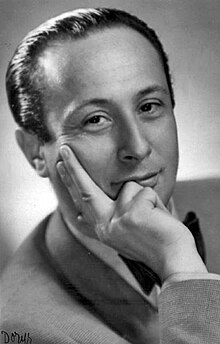Wladyslaw Szpilman
| Władysław Szpilman | |
|---|---|
 |
|
| Born |
5 December 1911 Sosnowiec, Congress Poland |
| Died | 6 July 2000 (aged 88) Warsaw, Poland |
| Resting place | Powązki Military Cemetery, Warsaw |
| Nationality | Polish |
| Occupation | Composer, pianist, author |
| Years active | 1930–2000 |
| Spouse(s) | Halina (Grzecznarowski) Szpilman (1950–2000; his death) |
| Children | Christopher Szpilman, Andrzej Szpilman |
Władysław Szpilman (Polish pronunciation: [vwaˈdɨswaf ˈʂpʲilman]; 5 December 1911 – 6 July 2000) was a Polish pianist and classical composer of Jewish descent. Szpilman is widely known as the central figure in the 2002 Roman Polanski film The Pianist, which was based on Szpilman's autobiographical account of how he survived the German occupation of Warsaw and the Holocaust.
Szpilman studied piano at music academies in Berlin and Warsaw. He became a popular performer on Polish radio and in concert. Confined within the Warsaw ghetto after the German invasion of Poland, Szpilman spent two years in hiding. Towards the end of his concealment, he was helped by a German officer who detested Nazi policies. After World War II, Szpilman resumed his career on Polish radio. Szpilman was also a prolific composer; his oeuvre included hundreds of songs and many orchestral pieces.
Szpilman began his study of the piano at the Chopin Academy of Music in Warsaw, Poland, where he studied piano with Aleksander Michałowski and Józef Śmidowicz, first- and second-generation pupils of Franz Liszt. In 1931 he was a student of the prestigious Academy of Arts in Berlin, Germany, where he studied with Artur Schnabel, Franz Schreker and Leonid Kreutzer. After Adolf Hitler was appointed Chancellor of Germany in 1933, Szpilman returned to Warsaw, where he quickly became a celebrated pianist and composer of both classical and popular music. Primarily a soloist, he was also the chamber music partner of such acclaimed violinists as Roman Totenberg, Ida Haendel and Henryk Szeryng, and in 1934 he toured Poland with U.S. violinist, Bronislav Gimpel.
...
Wikipedia
